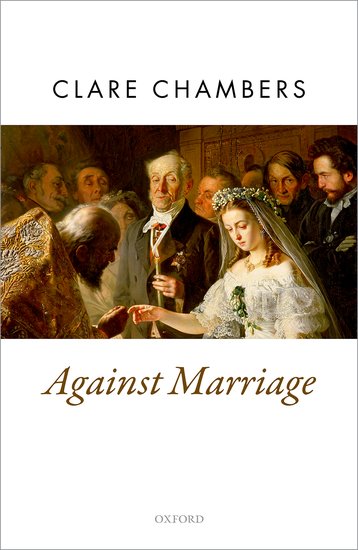
Against Marriage: An Egalitarian Defence of the Marriage-Free State
Against Marriage was published by Oxford University Press in 2017, with a paperback in 2019. Read the book on Oxford Scholarship Online here.
Winner of the APSA David Easton Award 2018.
Synopsis
Against Marriage is a radical argument for the abolition of state-recognised marriage. Clare Chambers argues that state-recognised marriage violates both equality and liberty, even when expanded to include same-sex couples. Instead Chambers proposes the marriage-free state: an egalitarian state in which religious or secular marriages are permitted but have no legal status.
Part I makes the case against marriage. Chambers investigates the critique of marriage that has developed within feminist and liberal theory. Feminists have long argued that marriage is a violation of equality since it is both sexist and heterosexist. Chambers endorses the feminist view and argues, in contrast to recent egalitarian pro-marriage movements, that same-sex marriage is not enough to make marriage equal. Chambers argues that state-recognised marriage is also problematic for liberalism, particularly political liberalism, since it imposes a controversial, hierarchical conception of the family that excludes many adults and children.
Part II sets out the case for the marriage-free state. Chambers critically assesses recent theories that attempt to make marriage egalitarian, either by replacing it with relationship contracts or by replacing it with alternative statuses such as civil union. She then sets out a new model for the legal regulation of personal relationships. In the marriage-free state regulation is based on relationship practices not relationship status, and these practices are regulated separately rather than as a bundle. The marriage-free state thus employs piecemeal, practice-based regulation. Finally, Chambers considers how the marriage-free state should respond to unequal religious marriage. The result is an inspiring egalitarian approach that fits the diversity of real relationships.
Reviews
“Clare Chambers has produced what will surely be for years to come the definitive argument for the abolitionist view of marriage. … [T]his is in my opinion a superb book. It is prodigiously scholarly, but at the same time wonderfully clear and accessible. The arguments are provocative and challenging throughout. The literature on this vitally important topic urgently needed a book-length defense of the abolitionist position. It is hard to imagine a book performing this necessary role better than Chambers’s Against Marriage.”
Ralph Wedgwood in Ethics
Against Marriage is “political philosophy at its most practical and readable.”
Andrew Harrop, General Secretary of the Fabian Society, in Fabian Review
“This is a distinct and important contribution to an increasingly crowded field of liberal political philosophy on marriage and the state and, perhaps most interestingly, to our understanding of the liberal project broadly. … Where other liberals seek more vigorously to balance competing demands of freedom and equality, or emphasize freedom, Chambers hews rigorously to an egalitarian position. You won’t find another book that does this so effectively or by way of such productive engagement with existing scholarship. Laying out the egalitarian case in such clear and compelling terms, Chambers highlights the challenges it presents to the liberal side of her liberal feminist equation. In so doing, Against Marriage leaves us wondering just how tenable the liberal feminist project is. … Chambers leads us to these questions by bringing us to the edge of the liberal feminist frontier. This alone would make Against Marriage a distinct and important contribution. But, of course, Chambers does more. She offers a compelling vision of why and how to move beyond marriage and points us in the direction of work that needs to be done. All with the grace and graciousness of an analytical philosopher running at full throttle.”
Tamara Metz in Political Theory
“Against Marriage makes an important contribution to the debate over the future of marriage within liberalism. It is clear and cogently argued and a pleasure to read. One of its virtues is its breadth; it makes arguments which address a range of liberal and feminist views and should be accessible to non-specialists. At the same time, it advances the leading edge of the specialist debate in provocative and intriguing ways.”
Elizabeth Brake in Mind
“Clare Chambers provides a clear, lucid and timely argument against state-recognized marriage based on the liberal principles of liberty and equality. … Throughout, she is masterful at anticipating and responding carefully to potential objections to her arguments and proposals. …. And her responses to those who might disagree with her proposals reveal a two-fold carefulness: as a philosopher, she is thoughtful, deliberate, precise, and meticulous; as a feminist, she is attentive, concerned, and compassionate — considering not only the philosophical justifications for her proposals but also their practical fall out for women and other vulnerable populations. … I highly recommend Chambers’ book as an important scholarly and pedagogical resource. It is beautifully crafted and makes an important contribution to the literature in liberal political theory and, more specifically, to the philosophical literature on marriage and family. … It was my distinct pleasure to read this book and be provoked by its arguments into a better understanding of both liberalism’s promise and its limitations with regard to its support of diverse forms of relationship.”
Shelley M. Park in Notre Dame Philosophical Reviews
“Chambers’ Against Marriage is a wonderful addition to a growing literature demanding that we think seriously about the institution of marriage and how it may have to be altered to meet the demands of justice and equity.”
Robert Scott Stewart in Metapsychology Online Reviews